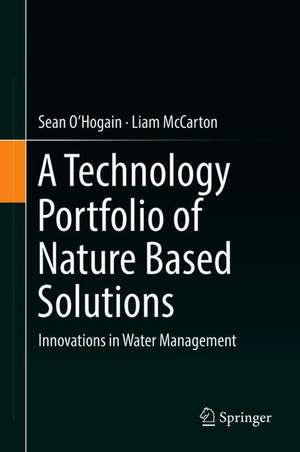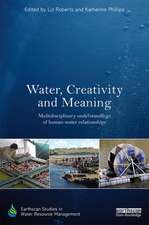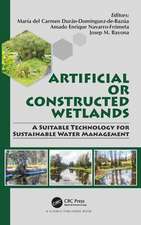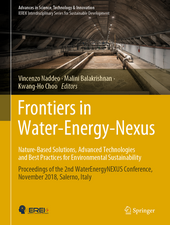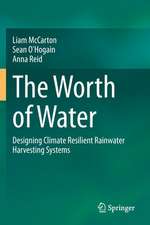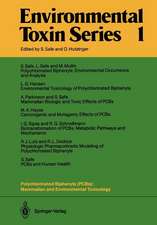A Technology Portfolio of Nature Based Solutions: Innovations in Water Management
Autor Sean O'Hogain, Liam McCartonen Limba Engleză Hardback – 18 mai 2018
The underlying philosophy of the book is the circular economy of water which prioritizes the concepts of resource recovery and resilience within water resource management. The first section of the book presents the background and objectives of the study, and how the action group aims to promote the use of nature based solutions through its diverse technology portfolio. Particular attention is given to the goals of finding cost-effective solutions for wastewater treatment, climate change mitigation, disaster risk reduction, flood protection, greening cities, degraded areas restoration and biodiversity preservation. The chapter on reclaimed water addresses water reuse and defines the term fit for purpose. Barriers and limitations related to NBS for water resource management are discussed. The book concludes with several case studies at local, regional and global levels which illustrate a new approach to water management. These case studies illustrate the application of a hybrid green and grey infrastructure system. This is a combination of traditional engineered infrastructure with nature based solutions which combines centralised and decentralised systems to optimise the reclamation of water for reuse in a fit for purpose model.
| Toate formatele și edițiile | Preț | Express |
|---|---|---|
| Paperback (1) | 571.16 lei 6-8 săpt. | |
| Springer International Publishing – 15 ian 2019 | 571.16 lei 6-8 săpt. | |
| Hardback (1) | 577.22 lei 6-8 săpt. | |
| Springer International Publishing – 18 mai 2018 | 577.22 lei 6-8 săpt. |
Preț: 577.22 lei
Preț vechi: 679.08 lei
-15% Nou
Puncte Express: 866
Preț estimativ în valută:
110.47€ • 114.12$ • 91.93£
110.47€ • 114.12$ • 91.93£
Carte tipărită la comandă
Livrare economică 26 martie-09 aprilie
Preluare comenzi: 021 569.72.76
Specificații
ISBN-13: 9783319732800
ISBN-10: 3319732803
Pagini: 129
Ilustrații: XXIII, 122 p. 89 illus., 88 illus. in color.
Dimensiuni: 155 x 235 mm
Greutate: 0.39 kg
Ediția:1st ed. 2018
Editura: Springer International Publishing
Colecția Springer
Locul publicării:Cham, Switzerland
ISBN-10: 3319732803
Pagini: 129
Ilustrații: XXIII, 122 p. 89 illus., 88 illus. in color.
Dimensiuni: 155 x 235 mm
Greutate: 0.39 kg
Ediția:1st ed. 2018
Editura: Springer International Publishing
Colecția Springer
Locul publicării:Cham, Switzerland
Cuprins
Chapter 1. Nature-based Solutions.- Chapter 2.EIP Action Group NatureWat (AG228).- Chapter 3. Nature-based Solutions – Technology Portfolio.- Chapter 4. Reclaimed Water.- Chapter 5. Constraints and Barriers to the adoption of NBS.- Chapter 6. Local, Regional and Global Potential of NBS.
Notă biografică
Dr. O’Hogain is a lecturer in the School of Civil & Structural Engineering at Dublin Institute of Technology , specialising in water and wastewater analysis. His research topics have included Reed beds, Rainwater Harvesting and International Development, and he has conducted research projects in Ireland, Latin America and Africa.
Dr. Liam McCarton is a lecturer in the School of Civil & Structural Engineering at Dublin Institute of Technology. He is Director of Engineers Without Borders, Ireland. He is experienced with over twenty five years of lecturing, international development program management, environmental engineering design and commissioning of water and sanitation, and education and health infrastructure projects.
Dr. Liam McCarton is a lecturer in the School of Civil & Structural Engineering at Dublin Institute of Technology. He is Director of Engineers Without Borders, Ireland. He is experienced with over twenty five years of lecturing, international development program management, environmental engineering design and commissioning of water and sanitation, and education and health infrastructure projects.
Textul de pe ultima copertă
This book aims to define the concept of Nature Based Solutions (NBS) by using case studies from members of the European Innovation Partnership (EIP) Water Action Group - NatureWat. NBS is defined and characterized in terms of water source, contaminants, removal mechanisms and resource recovery potential. The case studies presented illustrate the appropriateness of NBS promoting climate resilience. Readers will discover a technology portfolio based on a number of demonstration sites in the fields of climate change adaption, water and wastewater treatment, resource recovery and re-use, and restoring ecosystems to promote the use of nature based solutions. The chapters in the book present a multidisciplinary approach involving social scientists, governance representatives and engineers.
The underlying philosophy of the book is the circular economy of water which prioritizes the concepts of resource recovery and resilience within water resource management. The first section of the book presents the background and objectives of the study, and how the action group aims to promote the use of nature based solutions through its diverse technology portfolio. Particular attention is given to the goals of finding cost-effective solutions for wastewater treatment, climate change mitigation, disaster risk reduction, flood protection, greening cities, degraded areas restoration and biodiversity preservation. The chapter on reclaimed water addresses water reuse and defines the term fit for purpose. Barriers and limitations related to NBS for water resource management are discussed. The book concludes with several case studies at local, regional and global levels which illustrate a new approach to water management. These case studies illustrate the application of a hybrid green and grey infrastructure system. This is a combination of traditional engineered infrastructure with nature based solutions which combines centralised and decentralised systems to optimise the reclamation of water for reuse in a fit for purpose model.
The underlying philosophy of the book is the circular economy of water which prioritizes the concepts of resource recovery and resilience within water resource management. The first section of the book presents the background and objectives of the study, and how the action group aims to promote the use of nature based solutions through its diverse technology portfolio. Particular attention is given to the goals of finding cost-effective solutions for wastewater treatment, climate change mitigation, disaster risk reduction, flood protection, greening cities, degraded areas restoration and biodiversity preservation. The chapter on reclaimed water addresses water reuse and defines the term fit for purpose. Barriers and limitations related to NBS for water resource management are discussed. The book concludes with several case studies at local, regional and global levels which illustrate a new approach to water management. These case studies illustrate the application of a hybrid green and grey infrastructure system. This is a combination of traditional engineered infrastructure with nature based solutions which combines centralised and decentralised systems to optimise the reclamation of water for reuse in a fit for purpose model.
Caracteristici
Defines Nature Based Solutions in terms of water source, contaminants, removal mechanisms and resource potential within the context of a Circular Economy Presents a technology portfolio of Nature Based Solutions collated from best practice within the European Innovation Platform Action Group - NatureWat Offers a multidisciplinary approach to nature based solutions by bringing together social scientists, governance representatives and engineers
